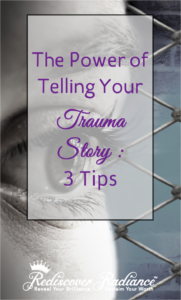We all have a story to tell. And telling your story is as ancient a tradition as civilization itself. From the proverbial “One That Got Away” slightly-exaggerated fish tales, to “How You Met Your Honey,” stories shape our lives. Your first heartbreak. How you got engaged. That time your boss fired you simply for doing your job.
The high points and low points of your life beg for a witness. By telling your story, you seek connection. Validation of your feelings. Perhaps even approval from others.
 In an earlier post, I told my story of how a rock slide wrecked our car and left us stranded in the middle of nowhere. The close call scared my family. However, once the immediate danger subsided, and we’d arrived safely back home, we told our story to anyone who’d listen. Parts of the story even became humorous. I joked about being stalked by an axe murderer. (The circumstances certainly resembled a B-rated horror flick.)
In an earlier post, I told my story of how a rock slide wrecked our car and left us stranded in the middle of nowhere. The close call scared my family. However, once the immediate danger subsided, and we’d arrived safely back home, we told our story to anyone who’d listen. Parts of the story even became humorous. I joked about being stalked by an axe murderer. (The circumstances certainly resembled a B-rated horror flick.)
Telling our story gave us healing and closure. It helped us process the emotions and gain some perspective on the event. It brought a healthy dose of empathy from our friends. And it gave us a running private joke in our family about how day trips are NOT our friend).
Telling your story certainly has healing power.
However, when your story involves significant trauma, telling your story isn’t always that easy. Feelings of guilt, responsibility, and culpability can hinder you from telling your story. Shame is a near-universal factor involved in telling your trauma story – one that keeps far too many people silent. Thankfully, things are changing a bit with the recent flood of people who’ve come forward with sexual assault allegations against various celebrities and politicians. (Read my article about Taylor Swift here). Right now, it’s seen as brave and heroic to share you story of sexual assault (#metoo). However, I fear that it’s only a matter of time until this “trend” dies down and shame becomes the dominant emotion associated with such trauma once again.
With these facts in mind, I compiled Three Tips on Telling Your Story:

Telling Your Story Tip #1: Tell the right person
 Maybe you dream of writing a scathing tell-all book to tell your story once and for all. But let’s be honest. In this social-media-saturated world, where everyone makes everything their business, you will be judged. You may or may not be ready for that. (Chances are, you’re not.)
Maybe you dream of writing a scathing tell-all book to tell your story once and for all. But let’s be honest. In this social-media-saturated world, where everyone makes everything their business, you will be judged. You may or may not be ready for that. (Chances are, you’re not.)
And when you finally muster the courage to tell your story, it won’t always garner empathy from friends and family. Quite the opposite, in fact. Telling your story often sparks anger and denial from those closest to you – especially when the perpetrators of the trauma are family members.
One of my clients lamented that when she finally broke the silence about the years of abuse she endured from her uncle, her mother and siblings alternately accused her of inviting the abuse, outright lying, and “imagining it.” Even a sister (whom my client witnessed first-hand being abused by said uncle) denies it vehemently to this day.
Needless to say, telling her story in that environment did NOT bring healing, closure, or any sense of peace about the event. Now, in addition to the memories of the traumatic event itself, she’s now endured five years of victim-blaming and shaming from those who are supposed to love her the most.
While telling your story is a crucial component to healing from trauma, you must tell your story to the right person.
In the beginning, especially, the “right person” may NOT be family. Be certain that the first people in whom you confide will respect your story and keep it safe – not blame you or shame you. Often, it’s best to share your story with a trusted friend, a support group, or a committed yet neutral third party like a counselor or trauma recovery coach.
Later, once you’re stronger – once you’ve turned your trauma story into a truly redemptive story of empowerment – then you can share your story with others. But in the beginning, play it safe.

2 replies to "Trauma Healing: 3 Tips for Telling Your Story (Part One)"
[…] In my last post, I shared one of my top tips for telling your trauma story. When you’re finally ready to break the silence, you may be tempted to scream it from the rooftops and tell the world. You’d probably feel a big sense of relief to finally get that secret out in the open. But it could also cause bigger headaches than you’re prepared for. Before you contact the Hallmark channel to make your life story into a movie of the week, do yourself a huge favor and read tip #1. You’ll thank me for it, I promise 🙂 […]
[…] matters. That’s why I wrote three blog posts this year about telling your story. (Read them here, here, and […]